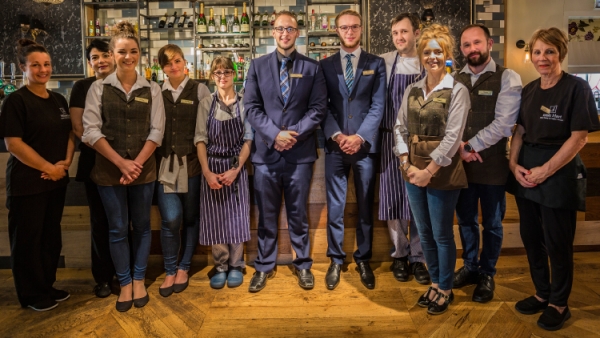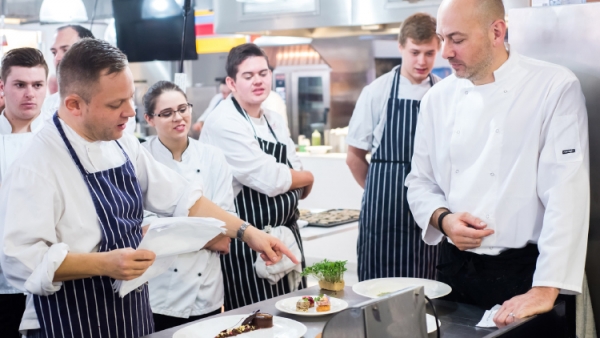How pubs have plugged the chef recruitment gap

Chefs are in demand, which can make finding and keeping the best ones a tough job for any pub. Three business people who have trained chefs from within explain how they did it,
and offer their expert advice.
“It is an exceptionally hard role to recruit for,” says Simon Howlett, executive development chef at Shepherd Neame. “One of the things we do to counteract that is find people at the lower level, train them up and develop a career path for them.”
The group has five mentors spread across the company who help to identify future stars. The company also has a ‘finder’s fee’ reward-type scheme: if a team member can introduce
a chef to the company who stays for six months, they get a one-off bonus payment.
Training staff from entry levels is becoming more common and a good way to nurture loyalty. Because there is such an industry shortage of chefs, Howlett says, they now regularly recruit people who don’t have any catering background.
“Now you are looking at everyone, even if they have no catering skills,” he says. “But if they’re passionate about food, we can teach the rest. And on-the-job training can be a lot quicker and easier than two years at college because it’s such a practical skill.”
Working conditions
But it’s not just about recruiting kitchen staff it’s about retaining them too and Howlett says that it’s really important to make the environment comfortable and to look at working conditions. Making sure there is air conditioning, is a good example, particularly for those hot summer months.
Lee Melton, head of learning and development at Coaching Inn Group, agrees. “The days of just paying someone the best you can are gone,” he adds. “To attract and keep the best people you have got to try and be the best employer you can be.”
Coaching Inn Group has a generous employment package including such things as a wellness grant to help staff pay for things like gym membership, a bicycle, or yoga lessons. “Because we know there is an industry shortage of chefs, we have got to think outside the box,” he explains. “It isn’t just about getting in a great head chef and the staff will follow.”
Melton also adds that people coming in today want a purpose and want to feel they are contributing and are developing their skills and potential. “We are constantly investing in our teams so that everyone is progressing, no one is left standing still. Unlocking potential is our mantra.”
Training up from entry levels is definitely a way forward providing you’ve got the right fit. “It’s all about personality. You can find a chef with all the skills but if they are really negative that will affect the whole team.
“We want someone who will have a positive influence because, if we can find that person, the whole team becomes engaged. The number one thing you look for is personality and positivity.
“Gone are the days when you had chefs standing and shouting in the kitchen. It doesn’t work anymore.”
‘Food safari’ programme
Coaching Inn Group has a well-developed chef training programme (and all-round training for all its departments), which Melton says creates a buzz within the company and creates engagement and excitement.
The company’s head chef has created a ‘food safari’ programme where he takes the kitchen team to on-trend restaurants. This is complemented with visits to suppliers such as Oliver Kay, its fruit and veg company.
Staff bring back a buzz and excitement and try to put what they’ve learned into dishes and on the menu. Melton says the food safari is talked about across the company. The company’s all-round training programmes also helps to multi-skill its workforce so that if they are short in the kitchen, for example, front of-house staff can help out in busy periods. It has also helped the company find new chef recruits.
New career path
At its Talbot Hotel in Oundle, Northamptonshire, one of its trainee managers, on completing the course, went to retrain as a chef in its kitchen. As part of the management training programme, staff spend at least two weeks in each department.
“He had never worked a day in the kitchen before that,” says Melton. “He enjoyed it so much that his career path changed. We are finding this more and more. And all of a sudden we are not having such a recruitment problem and also retention is better. It saves a lot of time and expense.”
Another example Melton points to is an older man who came in as a porter but through the encouragement of the head chef became more involved in food prep. His enthusiasm shone through and the head chef and management team encouraged him to train with them as a commis chef.
Taking more responsibility
A similar success story can be found at the family-run Dovecote Inn, in Nottinghamshire. Part-time pot washer Nathan Reynolds took a job there while studying at college but enjoyed the role and took on more responsibility.
The Dovecote Inn enlisted help from HIT Training to help Reynolds take a Level 2 Commis Chef apprenticeship.
“He’s progressed leaps and bounds since taking on the apprenticeship and it’s a joy to see him working alongside our head chef full time,” says Linda Brown, owner of the Dovecote Inn. “As Nathan trains for his qualification, he learns on the job, helping him to grasp our style and get to know the intricacies of our kitchen.
“This is important to us as we can build on and refine our food offer – without a full team of trained chefs, this wouldn’t be possible.”
Reynolds has done so well he made it through to the HIT Training’s MasterChef competition grand final and the Dovecot Inn team is extremely proud of him.
The pub has employed four apprentice chefs so far and Brown says it has been “great to give young people something to aim for” and has “definitely” helped with retention. She adds that “without a doubt” if the business requires it in the future they will invest in another chef apprenticeship.
To find out more about growing your own chefs, download The Morning Advertiser’s new guide.










